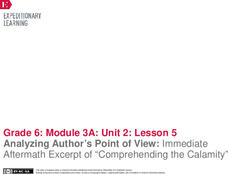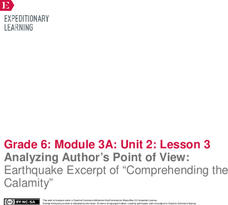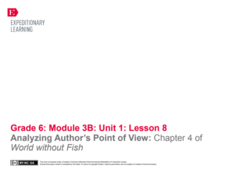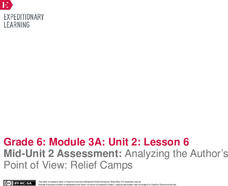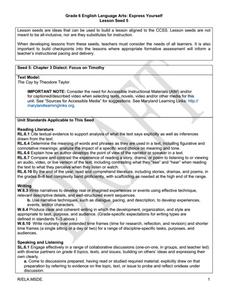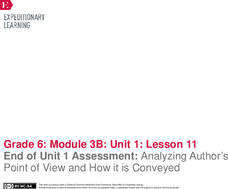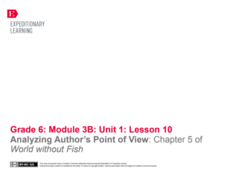EngageNY
Analyzing Author’s Point of View: Immediate Aftermath Excerpt of “Comprehending the Calamity"
Analyze that! Scholars continue reading and analyzing a primary source about the immediate aftermath of the 1906 San Francisco fire and earthquake. Then, individuals use graphic organizers to identify the author's point of view.
EngageNY
Analyzing Author’s Point of View: Earthquake Excerpt of “Comprehending the Calamity”
How do authors convey their points of view? Using the resource, scholars read an excerpt from a primary source document about the 1906 San Francisco earthquake. Then, they complete graphic organizers to analyze the author's point of view.
EngageNY
Analyzing Author’s Point of View: Chapter 4 of World without Fish
Give me a clue. Scholars work in triads to use highlighters and mark clues that lead to the author's point of view in World without Fish. The Author’s Point of View graphic organizer helps them map out their thoughts.
EngageNY
Mid-Unit 2 Assessment: Analyzing the Author’s Point of View: Relief Camps
We're halfway there ... what a relief! Scholars read an excerpt from a primary source about the relief camps associated with the1906 San Francisco earthquake. Next, they complete a mid-unit assessment, answering short-answer and...
EngageNY
Reading for Gist and Analyzing Point of View: Moon Shadow
Character analysis isn't always earth-shattering. Using a graphic organizer, pupils analyze Moon Shadow's point of view following the earthquake in Laurence Yep's Dragonwings. Also, scholars co-create an anchor chart showing the...
Library of Congress
Determining Point of View: Paul Revere and the Boston Massacre
If you're teaching point of view, this is the lesson for you! First, decipher the writer's point of view from a primary resource, then compare and contrast the primary source with a secondary source to explore the Paul Revere's engraving...
Curated OER
Express Yourself Lesson Seed 5
Building on the previous activity in this series of lesson seeds, this plan focuses on the use of dialect in Theodore Taylor's novel, The Cay. Class members examine specific lines of text, use their reading journals to respond to the...
Polk Bros Foundation
Contrast Points of View
Compare two positions on the same topic and assess the positions for logical argument with a basic worksheet. Pupils fill in information about each position, note down which position is more logical, and compose a few sentences...
EngageNY
End of Unit 1 Assessment: Analyzing Author’s Point of View and How it is Conveyed
One step at a time. Scholars complete the end of unit assessment by reading pages 70–75 of World without Fish and analyzing each paragraph one at a time. They highlight key words leading to author's point of view and complete a point of...
EngageNY
Analyzing Author’s Point of View: Chapter 5 of World without Fish
That's an interesting perspective. Scholars read chapter five of World without Fish and use an Author’s Point of View graphic organizer to determine the author's perspective. In triads, they highlight words that support the author's...
Curated OER
William Apess and the Mashpee "Revolt" of 1833
Prompt your class with the following question: What was the status of American Indians in Massachusetts during Jackson's presidency? To answer this question, class members will read a series of primary source documents (attached),...
Curated OER
Whose Rite Is It?
The class explores and debates, from multiple perspectives, a petition to allow Hopi Indians to take golden eagle hatchlings from a federal wildlife sanctuary for use in a religious ceremony. Pupils defend their personal views on the...
Idaho State Department of Education
Lessons for Social Studies Educators
Point of view, purpose, and tone: three concepts readers of primary and secondary source materials must take into account when examining documents. Class members view a PowerPoint presentation and use the SOAPS strategy to identify an...
Channel Islands Film
Santa Cruz Island - Writing for Information
After re-viewing a documentary segment on the restoration of Santa Cruz Island,, individuals craft an essay in which they compare the views of the various stake holders featured in the video and identify the point of view they find the...
Nancy N. Boyles
Summary Frame for Story Text and Informational Text
Provide these templates as aids for pupils as they work to compose summaries of both stories and informational texts. The first two frames provide sentence starters to help learners structure their summaries and include all the necessary...
Benjamin Franklin Tercentenary
Franklin’s Philadelphia: Another Point of View
While Benjamin Franklin enjoyed fame and success in colonial Philadelphia, that was not the experience of all coming to the British colonies. Young scholars trace the life of an indentured servant using a scholarly biography and reading...
Channel Islands Film
Step Into the Shoes
Small groups create skits that illustrate the different perspectives of those involved in the transitioning of Santa Rose island from private ownership to National Park.
Channel Islands Film
A Time Capsule of a Lost Early California Lifestyle
After viewing The Last Roundup, a documentary that examines the transitioning of Santa Rosa from a privately owned island to a National Park, class members adopt the point of view of Tim Vail, a member of the family that once owned the...
Curated OER
In God We Trust; All Others Pay Cash
Learners review their knowledge on the First Amendment. After reading an article, they identify specific church and state issues. Using the Internet, they research President Bush's proposal from a specific point of view. They summarize...
Channel Islands Film
Santa Cruz Island Restoration Narrative
What would you be willing to do to save an animal from extinction? After re-viewing a video about the restoration of the Island Fox on Santa Cruz Island, individuals adopt the point of view of one of the key players in the debate and...
Channel Islands Film
Santa Cruz Island - Visible Thinking Routines
Visible Thinking Routines are designed to help learners deepen their understanding of what they are learning and enable them to communicate their understanding of concepts to others. Individuals adopt one of these routines to use to...
Penguin Books
Core Curriculum Lesson Plans for Jefferson's Sons
Thomas Jefferson lived a controversial life. A series of lesson plans shares information about Jefferson's Sons, a novel about the infamous founding father. Discussion questions and other tasks explore different points of view and cover...
Curated OER
Criminal or Hero
Young scholars investigate slavery in America circa the American Revolution. They will examine point- of view and perspective as they research a variety of informational resources. While this is designed to be used with the PBS video...
Curated OER
For the Record
Young scholars read a New York Times article in order to examine the importance of cultural artifacts. They create essays from the point of view of one cultural artifact to demonstrate the knowledge they gained by doing research.
Other popular searches
- Authors Point of View
- Teaching Point of View
- Author's Point of View
- Point of View Rubric
- Identifying Point of View
- Point of View Narrator
- First Person Point of View
- Animal Point of View
- Different Point of View
- Third Person Point of View
- Ants Point of View
- Message Point of View


